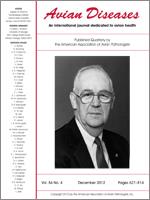Adult mallard ducks (Anas platyrhynchos) were orally dosed with bunker C fuel oil for 5 days, and five different inflammatory markers (haptoglobin, mannan-binding lectin, ceruloplasmin, unsaturated iron-binding capacity, and plasma iron) were measured in blood plasma prior to and 8, 24, 48, and 72 hr following exposure. In order to contrast the response to fuel oil with that of a systemic inflammatory response, an additional five ducks were injected intramuscularly with bacterial lipopolysaccharide (LPS). Oil-treated birds had an inflammatory marker profile that was significantly different from control and LPS-treated birds, showing decreases in mannan-binding lectin-dependent hemolysis and unsaturated iron-binding capacity, but no changes in any of the other inflammatory markers. Birds treated with oil also exhibited increased liver weights, decreased body and splenic weights, and decreased packed cell volume.
How to translate text using browser tools
1 December 2012
Inflammatory Markers Following Acute Fuel Oil Exposure or Bacterial Lipopolysaccharide in Mallard Ducks (Anas platyrhynchos)
Kelly A. Lee,
Lisa A. Tell,
F. Charles Mohr
ACCESS THE FULL ARTICLE

Avian Diseases
Vol. 56 • No. 4
December 2012
Vol. 56 • No. 4
December 2012




